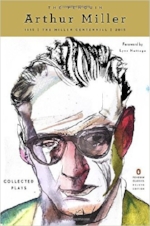A View from the Bridge (1955)
by Arthur Miller.
A characteristically tightly-constructed drama/tragedy. It centers around Eddie Carbone, who has an inappropriate attachment to his niece and sexual frustration with his devoted wife. The plot begins when his wife Beatrice's cousins come from Italy to Brooklyn to work as undocumented/illegal migrants. The niece falls in love with one of these cousins, and Eddie’s jealousy is awakened. The play features a narrator, Alfieri, and feels almost like noir, more dated than "All My Sons," "Death of a Salesman” and “The Crucible," which preceded it. It's still evident a master is at work, not so much with character but with plot. The Italian neighborhood differs from his other work, but other elements are similar: He again features that relentless plotting, the pushing of the drama to its boiling point and then the maintaining of it. The act break has a great twist, and overall the play makes you feel the slight nausea of the roller coaster. It's good that Miller doesn't kill off the females in his plays, even when he doesn't write a complex one.
Eddie is similar to John Proctor (from "The Crucible") in his flawed protagonist self and his positioning in the midst of a similar love triangle. Proctor is more noble, and Eddie more Freudian. He’s fixated on accusing one of the cousins of being a homosexual; it’s an odd plot strand that is reminiscent of contemporary pieces by Williams and Albee. His homophobia seems a product of his own sexual deviance. Alfieri remarks something about his purity, as in he allows "himself to be wholly known." Despite this assertion, I think Eddie remains somewhat opaque. He has no moments when his own awareness or shame awakens, and unlike Willy, his fragility and vulnerability are not exposed concurrently with his pride and insistence on his own dignity. Eddie is presented more from one point of view, somewhere between decent and deviant, but ultimately swept up in the reins of his impassioned chargers. The other characters are simple types.
The play does highlight the social issue of illegal immigration as a direct result of economic refugees' struggle to survive — just with Italy as the decimated landscape, not Mexico or Central America.
(Further Reading: "UNC's Paul Green: a like-mind in a different time")

